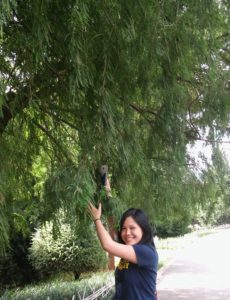Hei, I’m Molly. I’m currently a Ph.D. candidate at the University of Michigan in the Earth and Environmental Sciences Department studying palaeobotany under Dr. Selena Smith. I worked in plant science research labs at both University of California, Los Angeles (UCLA) and Berkeley, after receiving a B.S. in Ecology and Evolutionary Biology from UCLA. My main scientific interest and current research investigates how climate has shaped plant evolution and biogeography through time and how this will be influenced by changing global climate. With current rapid climate change, it is important to understand how plants will respond to shifts in climate. My approach combines modern and fossil plants to investigate leaf anatomy and physiology across climate gradients within in the family Cupressaceae.
This short course on Svalbard is an opportunity for me to learn more about collecting and analysing plant functional traits, meet experts in the field, and to practice data interpretation through science communication to other scientists and the public. I think this course will be a very valuable experience, where I will get feedback on how to improve and learn new communication skills, an interest that has grown since I started graduate school. I am really excited to learn more about how plants in the Arctic relate to their climate and compare this data to plants across different biomes. I’m quite curious about our introduction to drones and attempting to manage my expectations on this and applications in plant sciences.
I’m also looking forward to the public outreach portion of the course. In the United States (US), climate change has been a very controversial issue for as long as I can remember, even though increasingly strong scientific evidence continues to support climate change. Some of this may be the result of communication as I’ve personally experienced being told about how great “clean coal” is for our environment. From what I remember reading, most people around the world accept that climate change is a huge issue caused by humans and from what I’ve read and seen pictures of, people who live in the Arctic experience the consequence of climate change much more than other nations, such as receding glaciers and melting permafrost, which has impacted not only wildlife, but the economy and infrastructure. From my understanding, there’s quite a diversity of people from different nations on Svalbard and I think it would be very interesting to learn what they have to say about climate change.
